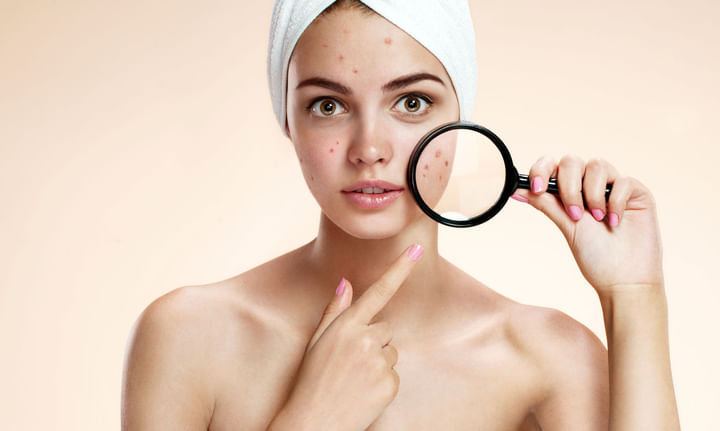Homeopathy to cure Acne
HERE ARE SOME FACTS ABOUT ACNE.
A) Acne is a skin disease involving the oil glands at the base of hair follicles.
B) It affects 3 in every 4 people ages 11 to 30 years.
C) It is not dangerous, but it can leave skin scars.
D) Treatment depends on how severe and persistent it is.
E) Risk factors include genetics, menstrual cycle, anxiety and stress, hot and humid climates, using oil- based makeup, and squeezing pimples.
WHAT IS ACNE?
Acne is a common skin problem.
Acne is a chronic, inflammatory skin disease that results in whiteheads, blackheads, pimplles, cysts, and nodules. It is not dangerous, but it can leave skin scars.
- Human skin has pores that connect to oil glands under the skin. Follicles connect the glands to the pores. Follicles are small sacs that produce and secrete liquid.
- The glands produce an oily liquid called sebum. Sebum carries dead skin cells through the follicles to the surface of the skin. A small hair grows through the follicle out of the skin.
- Pimples grow when these follicles get blocked, and oil builds up under the skin.
- They tend to appear on the face, back, chest, shoulders, and neck.
- Skin cells, sebum, and hair can clump together into a plug. This plug gets infected with bacteria, and swelling results. A pimple starts to develop when the plug begins to break down.
- Propionibacterium acnes (P. acnes) is the name of the bacteria that live on the skin and contributes to the infection of pimples.
- Research suggests that the severity and frequency of acne depend on the strain of bacteria. Not all acne bacteria trigger pimples. One strain helps to keep the skin pimple-free.
CAUSES
Acne stress
- Stress can be a key trigger of acne in some cases.
- A range of factors triggers acne, but the main cause is thought to be a rise in androgen levels.
- Androgen is a type of hormone, the levels of which rise when adolescence begins. In women, it gets converted into estrogen.
- Rising androgen levels cause the oil glands under the skin to grow. The enlarged gland produces more sebum. Excessive sebum can break down cellular walls in the pores, causing bacteria to grow.
- Some studies suggest that genetic factors may increase the risk.
Other causes include:
- some medications that contain androgen and lithium
- greasy cosmetics
- hormonal changes
- emotional stress
- menstruation
TYPES
Acne pimples vary in size, color, and level of pain.
The following types are possible:
- Whiteheads: These remain under the skin and are small
- Blackheads: Clearly visible, they are black and appear on the surface of the skin
- Papules: Small, usually pink bumps, these are visible on the surface of the skin
- Pustules: Clearly visible on the surface of the skin. They are red at their base and have pus at the top
- Nodules: Clearly visible on the surface of the skin. They are large, solid, painful pimples that are embedded deep in the skin
- Cysts: Clearly visible on the surface of the skin. They are painful and filled with pus. Cysts can cause scars.
TIPS FOR MANAGING ACNE
Here are some tips for looking after skin that has acne or is prone to it.
1.Wash your face no more than twice each day with warm water and mild soap made especially for acne.
2.Do not scrub the skin or burst the pimples, as this may push the infection further down, causing more blocking, swelling, and redness.
3.Avoid popping pimples, as this makes scarring likelier.
4.A specialist can treat a pimple that requires rapid removal for cosmetic reasons.
5.Refrain from touching the face.
6.Hold the telephone away from the face when talking, as it is likely to contain sebum and skin residue.
7.Wash hands frequently, especially before applying lotions, creams, or makeup.
8.Clean spectacles regularly as they collect sebum and skin residue.
9.If acne is on the back, shoulders, or chest, try wearing loose clothing to let the skin breathe. Avoid tight garments, such as headbands, caps, and scarves, or wash them regularly if used.
10.Choose makeup for sensitive skin and avoid oil-based products. Remove makeup before sleeping.
11.Keep hair clean, as it collects sebum and skin residue. Avoid greasy hair products, such as those containing cocoa butter.
12.Avoid excessive sun exposure, as it can cause the skin to produce more sebum. Several acne medications increase the risk of sunburn.
13.Use an electric shaver or sharp safety razors when shaving. Soften the skin and beard with warm soapy water before applying shaving cream.
14.Avoid anxiety and stress, as it can increase production of cortisol and adrenaline, which exacerbate acne.
15.Try to keep cool and dry in hot and humid climates, to prevent sweating.
Acne is a common problem. It can cause severe embarrassment, but treatment is available, and it is effective in many cases.



+1.svg)
